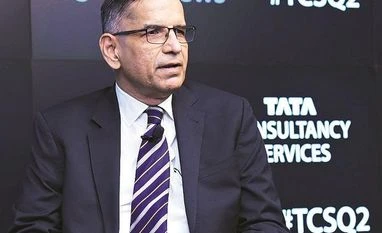Tata Consultancy Services (TCS) posted better-than-expected financial numbers in March quarter as well as in the whole of FY19 though experts had raised concerns on its margins. V Ramakrishnan, chief financial officer of TCS, tells Romita Majumdar that there will be no rethink of the firm’s margin growth strategy as it seeks to balance it on a thin rope with increasing demand. Edited excerpts:
Will margins continue to be a chink in the armour for TCS despite excelling in most other parameters? You have said you made it to the lower end of your aspirational margin band at 25.1 per cent, compared to 26-28 per cent. Is there a need to rethink the strategy?
There is no rethink here. We have always maintained our business model, which is aimed at creating more demand at the clients’ end. We certainly believe that the aspirational target for margins is something we should work towards. Of course, currency has an important role to play here. If the goal was outlandish, you can move away from that, but it’s not. As far as we are concerned, from a strategy point of view, there is no question of sacrificing margins for growth or vice versa. It’s not sustainable without the balance between the two.
You spoke about how localisation and location-independent-managed delivery models are the growth levers. What is the delivery ratio between the two?
Location-independent agile does not necessarily mean that it is (the work is getting done in) offshore. It simply means it is delivered in a distributed manner cutting across borders and multiple locations. How you deliver in an integrated manner through that is what makes it smart. It can drive a lot of efficiencies in terms of how we deliver projects. Agile methodology lends itself to significant benefits in how we develop software and applications. We have been training people in agile and get them certified and it has resonated well with the customers. Localisation (drive to localise the workforce) is independent of all these. It’s more to do with managing supply across international markets and integrate with those economies by expanding the talent pool.
Commensurate with the demand, have you started commanding a price premium for these new projects?
This is not a commodity business where prices will go up if demand increases or the other way around. Value is relative in terms of what it does for the client. In every situation, our idea is to maximise the value. This is also affected by the competitive situations in some cases, client budget, their appetite and priorities so on. But you can always start an engagement and bring in multiple levers to play as you expand that engagement.
With UK business growing 21 per cent, and BFSI being a large business there, is most part the growth in this vertical coming from this geography?
That’s not correct. In the UK, we are strong in BFSI, telecom, public service, retail, utility, and manufacturing. Within BFSI, insurance is very strong. The growth over the past two-three years in the UK has been across all segments as we have already mentioned in case of some big clients like Marks & Spencers. BFSI has grown everywhere, including in the US and Europe.
Your platform business, particularly in BFSI and retail, is strong. Is there a specific strategy in place there?
Platforms business is classified under the regional market business. The insurance platform has of course been a strong one and there are other products such as Optumera for retail, BaNCS for banking, financial and insurance sector, and Ignio. Our iON platform has been a very significant component of the platform strategy. In addition to BFSI and retail, there has been traction in public services as well.
What opportunities does TCS see in areas like 5G?
5G will impact every industry. There will be a change in connectivity. We are building skills to understand what it will mean for various industries. We have already started working in that area with some European clients. The adoption of 5G will increase in a few years and countries will have to adopt these standards.
What kind of client spending do you foresee for the next quarter? Does it look cautious?
Today, client spending is not just about budgets. A lot of that is about the business 4.0 strategy most have put in place. Some of it may not be budget-driven but more about how they can improve products, production, services, and delivery.
Demand will be client-led but there is a lot of opportunity in understanding the client business. All of those may not translate into opportunity. But with the kind of knowledge and scale that we have, we can suggest a lot of such opportunities. It will still depend on client priorities but especially in disruptive industries there is a lot of opportunities.
Unlock 30+ premium stories daily hand-picked by our editors, across devices on browser and app.
Pick your 5 favourite companies, get a daily email with all news updates on them.
Full access to our intuitive epaper - clip, save, share articles from any device; newspaper archives from 2006.
Preferential invites to Business Standard events.
Curated newsletters on markets, personal finance, policy & politics, start-ups, technology, and more.
)